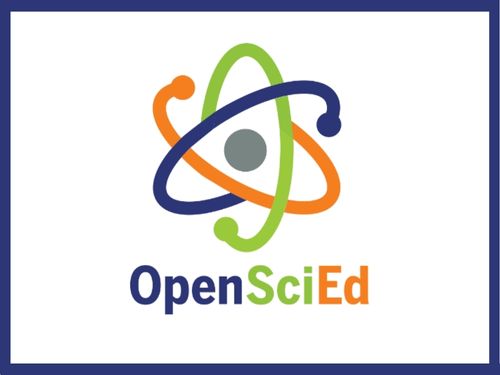OpenSciEd Developers Consortium for Middle School Science
OpenSciEd
The OpenSciEd initiative was launched by a consortium of funders led by the Carnegie Corporation of New York to address a critical need in science education: the need for high quality instructional materials that are standards-aligned and practical for broad implementation. In its first phase, OpenSciEd produced a comprehensive, three-year middle school science program.
OpenSciEd Developers Consortium
OpenSciEd instructional materials and accompanying resources for teacher professional development were created and field tested by a consortium of five nationally-recognized educational research and development organizations with the support of a broad network of leaders in science education.
The Consortium included BSCS Science Learning, Boston College, the Dana Center at The University of Texas-Austin, Digital Promise Global, and Northwestern University. These organizations and a network of expert individuals collaborated on all areas of work, under the direction of a steering committee made of educational leaders from ten OpenSciEd partner states.
BSCS was responsible for the leadership and coordination of the Consortium, whose work was organized across specialized centers.
Center: Materials Development
Leads: BSCS & Northwestern
Purpose: Develop and revise science instructional materials for grades 6-8.
Center: Professional Learning
Leads: Boston College
Purpose: Design and develop professional learning resources to support teachers before and during use of OpenSciEd instructional materials.
Center: Data Collection and Analysis
Leads: Digital Promise & Dana Center
Purpose: Design data collection protocol for formative evaluation of field tests, development of instruments, coding and analysis of data collected during field tests, and reporting to developers, partner states, and OpenSciEd organization.
Center: Field Test Implementation
Leads: Dana Center
Purpose: Plan and coordinate the field test professional development and field test data collection.
Work of Consortium
The Consortium’s goal was to create high quality instructional materials that are designed for next generation science and practical for teachers to implement in a diverse range of classroom contexts nationwide.
As a first step toward this goal, The Consortium created program design specifications and a three-year scope and sequence. These foundational documents helped guide the Consortium in developing the full middle school science program—which includes student materials, teacher guides, and resources for teacher professional development including classroom videos. The resulting program implements the entire set of NGSS for grades 6-8 and meets the review criteria for Achieve’s EQuIP rubric.
This was a highly collaborative project, and the Consortium was committed to working closely with classroom teachers, specialists, and education leaders in the design and implementation of all materials. Each unit underwent an 18-month development process that included professional learning, robust field tests, revisions, and external reviews.
Professional Learning
The Consortium has designed professional learning around goals to promote the shifts in science standards. Teachers learn how to support productive science discussions and coherence in student learning, for example, as they navigate effective OpenSciEd unit instruction. After internally designing and delivering professional learning institutes for the first sets of units, the Consortium prepared science education leaders across the ten partner states to facilitate institutes moving forward.
Robust Field Tests
The Consortium field tested all units, measuring success through both student and teacher surveys. For example, do students feel they are able to contribute their own ideas? Are teachers able to use their students’ questions to drive learning? This survey data, which was largely positive across the ten partner states, informed unit revisions and the focus of future professional learning institutes. Hundreds of teachers and thousands of students across all ten partner states participated in the field testing process.
Revisions and External Reviews
The Consortium revised all units based on data from the field test and external reviews, including an EQuIP review by Achieve.
The first three units were released in August 2019, with three additional units released every six months thereafter. The complete middle school program was completed and released in 2022. As of February 2023, the program has earned “All-green” ratings from EdReports.
January 2022
The complete OpenSciEd middle school science program for grades 6-8 is released.
Summer 2019 – Winter 2022
Unit development process—which includes professional learning, robust field testing, revisions, and external reviews—continues, with subsequent rounds of units publicly released every six months. Educators across the ten partner states facilitate the professional learning during this timeframe.
August 2019
First three instructional materials units receive high ratings on the EQuIP rubric from Achieve’s Peer Review Panel and are publicly released.
January 2019
The Developers Consortium is selected to conduct the complete development of the OpenSciEd middle school science program.
September 2018
Carnegie Corporation is joined by Bill and Melinda Gates Foundation, Schusterman Foundation, and William and Flora Hewlett Foundation in issuing a request for proposals to conduct the complete development of the OpenSciEd middle school science program.
June 2018
Consortium provides professional learning and launches field test with educators in ten states for first three prototype units.
January 2018
Consortium creates a three-year scope and sequence and begins developing the first three instructional materials units.
November 2017
Carnegie Corporation of New York launches OpenSciEd initiative, recruits ten partner states, and contracts with the members of the Developers Consortium to create a scope and sequence, design specifications, and prototype units to lay the groundwork for the OpenSciEd middle school science program.
OpenSciEd is funded by the Carnegie Corporation of New York, Bill and Melinda Gates Foundation, Charles and Lynn Schusterman Foundation, and the William and Flora Hewlett Foundation.
